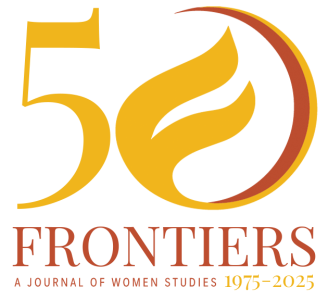About Frontiers
One of the premier publications in the field of feminist and gender studies, Frontiers has distinguished itself for its diverse and decisively interdisciplinary and activist publication agenda that explores the critical intersections among—to name a few dimensions—gender, race, sexuality, class, ability, faith, nationality, and transnationality. Many landmark articles have been published in Frontiers in its 50-year history, thus critically shaping the fields of women’s, gender, feminist, and sexuality studies. 
The University of Utah’s editorial collective for Frontiers is committed to embracing emerging visions of dynamic, undeterred, and unsettled “feminist frontiers.” As the journal’s guiding voice since 2017, we seek to advance feminist investigations and expressions into the 21st century. Frontiers—as a term or topic of analysis—evokes differing memories, figurations, affects, and effects. Questions of “whose frontiers,” “which frontiers” and how is a “frontier” even formed—by who and where— are often debated and reconsidered. While we participate in “frontiers” as contested spaces, we simultaneously embrace the possibilities of thinking with and through frontiers as a way to foster and reinvigorate feminist and specifically women of color, queer, and decolonial feminist theorizing, pedagogy, and praxis.
Our editorial leadership reflects the journal’s interdisciplinary home in the University of Utah’s School for Cultural and Social Transformation. As an editorial collective, we bring expertise in various fields including education, media studies, sociology, religious studies, policy studies, ethnic studies, indigenous studies, literary studies, and of course, gender studies. Building on our diverse strengths, we welcome feminist scholarly essays and creative works utilizing a multitude of methods, practices, discourses, and theories. Our dedicated peer reviewers enhance and complement our strengths.
We are excited about the opportunity to commemorate Frontiers’ 50th anniversary in 2025. This significant milestone marks fifty years of feminist community, activism, and scholarship within multiple academic, political, and social challenges and constraints, including the current wave of antifeminist backlash.
Frontiers History
Frontiers is one of the oldest and most respected academic feminist journals in the United States. Frontiers began publication in 1975 at the University of Colorado, Boulder. The founding Editorial Collective (the advisory board of the host institution) chose the title “Frontiers” to signal that the journal would push the boundaries of feminist scholarship. Based on a consensus model with an inclusive vision, the Editorial Collective sought to bridge academic and community-based feminist knowledge through publishing accessible methodological and substantive articles along with creative works that emphasized the significance of women across a range of social realities and differences. “Frontiers” also historically denoted the journal’s original focus on the study of women in the Western U.S., which has since expanded to a more national and transnational scope—while embracing decoloniality and indigeneity even more closely.
Throughout its 50 years, the journal has traveled to five other institutions and editorial collectives: University of New Mexico, Washington State University, Arizona State University, Ohio State University, and its current home at the University of Utah. We are committed to serving and preserving Frontiers’ foundational vision as well as expanding and promoting a radically inclusive and transformative feminist agenda that does not flinch in the face of changing regimes and political regression. We plan to persist as we have for the last fifty years, and we thank our authors, reviewers, readers, subscribers, publishers, and supporters for standing by us.
